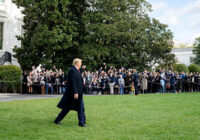America’s Cold War-era policies won’t work against Venezuela.
If the United States government was intent on choosing an ineffective and damaging response to the crisis in Venezuela, it need only use its foreign policy toward South and Central America during the Cold War as a blueprint. Potentially pre-empting the nascent anti-Maduro, Organization of American States coalition that his trip to the region sought to anneal, Vice President Mike Pence threatened Venezuela with an all-encompassing sanctions-based prescription to modify the behavior of the Maduro regime. This was likely meant as a more reasonable alternative to President Trump’s suggestion of possible military force.
Yet both of these suggestions are unwelcome in a continent afflicted by the memories of excessive intervention by the United States. Maduro’s attempts to impose autocracy have provided the United States with a historic opportunity to pursue a course salutary to Venezuelan society while improving its reputation. It should orient its foreign policy decision with this history in mind.
The situation Venezuela finds itself in today was predictable, attributable to policies pursued by the “Bolivarian” administration of Hugo Chavez. Powered by record oil profits, Venezuela was able to engage in the mass subsidization of essential items from food to medicine well below market price; Chavez and his successor, Nicolas Maduro, compounded these polices with the nationalization of private business and the creation of cheap government supermarkets.
Unsurprisingly, the collapse in oil prices meant that the goods subsidized so munificently by the Chavez regime could no longer be provided in the same quantity. Corruption, debt and wholesale nationalization continue to prevent Venezuela from responding to the economic crisis. Though a robust political opposition exists, it has been blocked from meaningful reform by a supreme court packed with pro-Maduro judges.
Knowing that the mass majority of Venezuelans are now suffering from an economy for which they hold Maduro responsible, Pence’s threat of broad-based sanctions are both tone deaf and counter-intuitive. A full-scale sanctioning of Venezuela’s oil industry would decimate the already dilapidated economy and send it into shock. This would allow Maduro to shift the blame from his administration to the “imperialist” United States. With an approval rating consistently hovering around 20%, it’s hard to see how a policy that causes further suffering would help.
Maduro doesn’t need the United States to be unpopular. A negatively perceived intervention by the US government, however, would boost his popularity by lending credence to his claims of US meddling. For the most applicable reference, a half century, full-scale embargo failed spectacularly to change the behavior of socialist Cuba, a country that Venezuela has attempted to mirror since 1999. While an embargo-reminiscent policy toward Venezuela would be unwelcoming, the mere suggestion of military intervention is a non-starter. Even in instances where the stated goals of the United States were met, the overall effect on the country in question was less than positive.
Old Habits
The invasion of Panama in 1989 to oust Manuel Noriega, an erstwhile American ally and dictator, was touted in the immediate aftermath as a success by then President George H.W. Bush. However, the consequences include suing of the United States by companies for postwar looting, a civilian death count ranging from the hundreds to the thousands, and a denunciation of the United States by most members of the United Nations General Assembly. Just as the Trump administration does not have the cache with the international community to risk further damage to its reputation, the people of Venezuela cannot risk the chaos that would follow even a “successful” military intervention.
Clandestine support for military opposition to Maduro should be discarded in the same vein. The Venezuelan military was able to easily quash an attempted military revolt by Captain Juan Caguaripano and other Venezuelan army defectors. If the United States were to pursue a strategy of arming and encouraging rebellion against the Maduro regime, it might want to look at several realities. A reservoir of armed, pro-government vigilante groups, known as colectivos, are in place to protect the Maduro government, willing to murder civilians opposing him. Promoting counter-Maduro vigilantism would undoubtedly tear at the seams of Venezuelan society to a point of no return. US Cold War policies supporting military dictatorships and right-wing death squads in El Salvador, Nicaragua and Guatemala have left those countries enveloped in a cycle of violence; the attainment of US goals for those countries hasn’t remedied the violence and poverty that they continue to face.
So for what result should the United States aim to achieve? The most auspicious outcome, out of the four outlined as likely by the Center for Strategic and International Studies, is quoted as follows: “A split within Maduro’s inner circle, the establishment of a stable and united political opposition lead[ing] to credible elections under a new National Electoral Council (CNE), monitored by the Organization of American States (OAS) and other observers and backed by a Supreme Tribunal of Justice (TSJ) with new members selected in accord with the current Constitution.”
Power Grab
So how would the fracturing of Maduro’s inner circle start? At the heart of the Maduro government’s power grab is the creation of its rubber-stamp Constituent Assembly. This is where direct US action should focus any initial, punitive action as it is the visible symbol of Maduro’s arbitrary power. Sanctions specifically hitting every member of the Constituent Assembly along with those close to Maduro will focus specifically on those that are inherently autocratic. Unlike extensive sanctions that hit the Venezuela’s oil sector (and by that extension its economy writ large), these sanctions would likely be supported by the OAS. More importantly, the impact wouldn’t result in added suffering for the Venezuelan populace.
As a prerequisite to ending these sanctions, the US should require the Maduro regime to lift the current barriers to allowing direct humanitarian aid to reach the Venezuelan people. Otherwise, Maduro would continue to pay a personal price for entrenching autocracy while being a visible barrier to the flood of necessary supplies. Directly goading OAS member states to involve themselves in the aid effort would strengthen the visibly beneficial US effort. Neighboring Colombia, for instance, has temporary granted legal status to some Venezuelans desperately crossing the border in search of food and medicine. Regardless of the outcome, this would have the salutary effect of aligning the Venezuelan populace with the United States.
Venezuela has chronic problems beyond its current crises. However, the United States has an opportunity to push the country in a direction so that the people of Venezuela have a chance to institute the change they have demanded and voted for. Since the foundation for a working government is there, the Trump administration should work with it. It neatly coincides with an “America First” repudiation of nation building from scratch. With the international community largely aligned against the Maduro regime, the policy it chooses should capitalize on this short-term consensus in the event that this chance proves ephemeral. Impacting the region for the better while improving its image will pay dividends. With that said, Cold War foreign policy should remain where suitable: as a blueprint for what not to do in South America.
The views expressed in this article are the author’s own and do not necessarily reflect Fair Observer’s editorial policy.
Photo Credit: sebastorg / Shutterstock.com
Support Fair Observer
We rely on your support for our independence, diversity and quality.
For more than 10 years, Fair Observer has been free, fair and independent. No billionaire owns us, no advertisers control us. We are a reader-supported nonprofit. Unlike many other publications, we keep our content free for readers regardless of where they live or whether they can afford to pay. We have no paywalls and no ads.
In the post-truth era of fake news, echo chambers and filter bubbles, we publish a plurality of perspectives from around the world. Anyone can publish with us, but everyone goes through a rigorous editorial process. So, you get fact-checked, well-reasoned content instead of noise.
We publish 2,500+ voices from 90+ countries. We also conduct education and training programs
on subjects ranging from digital media and journalism to writing and critical thinking. This
doesn’t come cheap. Servers, editors, trainers and web developers cost
money.
Please consider supporting us on a regular basis as a recurring donor or a
sustaining member.
Will you support FO’s journalism?
We rely on your support for our independence, diversity and quality.







